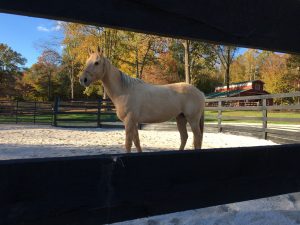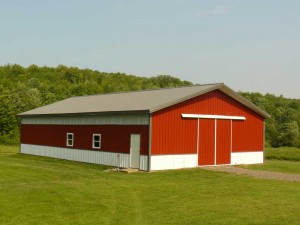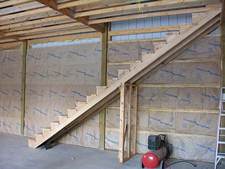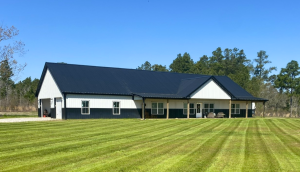Hansen Buildings Designer Randy had a client concerned about his horses chewing on the wood posts of his new pole building.
My daughter, Bailey, is a professional horse trainer, so over the years we have seen more than our share of horse stalls and barns which look as though they have been mauled by an army of giant termites. Of course the culprit has not been the creature from a bad 50’s B movie – it was the horses! This is a very common problem and there are a number of reasons why horses chew wood. And there are a number of solutions to the chewing, depending on the root of the problem.
There are basically three reasons why horses chew wood, they are bored, they have a nutritional deficiency, or out of habit.
Horses kept in stalls, small paddocks, secluded from other horses, or fed largely concentrates, without enough fodder to keep them chewing over a long time may become bored and chew their stalls for something to do. Very occasionally vitamin deficiencies may cause a horse to have what is called “pica”—a taste for strange foodstuffs in an effort to alleviate the deficiency. Some horses may have learned the habit from stable or pasture mates. Like mischievous “kids”, they try what the other “kids” are trying, even if they would never have thought of it on their own—and the habit sticks. Horses that crib or windsuck can also be hard on wood (and other surfaces too). However, this isn’t truly wood chewing and the solutions aren’t quite as easy.
 It’s very frustrating to put up a beautiful new barn and stalls only to have them chewed down within a few months. Horse stalls are expensive to replace or maintain, but the slivers and splinters can cause injury to your horse’s mouth and digestive system. Enough wood chips in a horse’s gut and a nasty case of colic could be the result.
It’s very frustrating to put up a beautiful new barn and stalls only to have them chewed down within a few months. Horse stalls are expensive to replace or maintain, but the slivers and splinters can cause injury to your horse’s mouth and digestive system. Enough wood chips in a horse’s gut and a nasty case of colic could be the result.
Don’t guess about whether a horse is missing out on an important mineral or vitamin or not. A veterinarian can draw a blood sample and find out exactly what nutrients the horse may be missing. This way, supplements may be added with the exact vitamin or mineral in the correct amounts. Guessing what the problem is may mean over or under supplementing the horse, throwing money away and not solving the problem, or creating another problem.
Horses kept indoors are likely to develop habits to alleviate their boredom and frustration. Horses in the wild spend the majority of their time grazing. When kept cooped up, restricting their diets, keeping them from being with other horses or not providing them with enough room to self-exercise…horses may find other ways to vent their frustration and show their boredom. Allowing horses to live as naturally with other horses as possible, outdoors with plenty of grass to nibble on will prevent wood chewing.
The least expensive solution is sprays, pastes or washes which have a bitter taste and are painted on to the wood surfaces (such as Denatonium Benzoate). The downside, some horses don’t seem to notice the taste and chew anyway.
Remember “Hoppity Hops”? These are those big rubber balls with a handle on them. My granddaughter has one and hops all over the house on it, complete with a pullover horse “costume”. I’ve seen my daughter Bailey place one of these rubber balls in the stall of an otherwise bored horse, who will kick it around the stall, rather than eating the stall walls down to toothpicks.
Nailing 1-1/2” inside measure aluminum “C” channels over the tops of stall walls, as well as aluminum “L”s on exposed edge can also be a deterrent (although not without expense).
Wood chewing need not be the reason for avoiding building a new horse stall barn, as it is a fairly easy problem to solve and finding the right solution can save money, as well as ensuring the good health of the horses.









